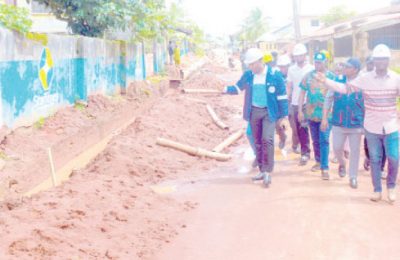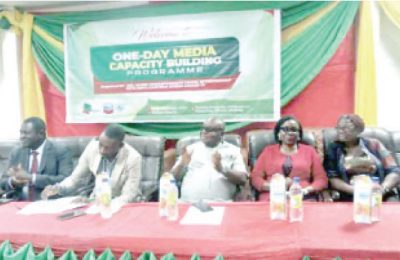WITH over three million cars and 100,000 commercial vehicles on the roads (when the national average is 11 vehicles per kilometer), Lagos daily records an average of 227 vehicles per every kilometer of roads. Lagos is home to about 2,000 industrial complexes, 10,000 commercial ventures, and 22 industrial estates. It accounts for over 60 percent of Nigeria’s industrial and commercial activities; 70 percent of national maritime cargo freight, over 80 percent of international aviation traffic, and over 50 percent of Nigeria’s energy consumption. All banks in the country are not only located in Lagos but have their headquarters in the state. Aside from this, Lagos consumes about 45 percent of the petroleum products in the country. The above statistics are what make Lagos a unique economic and industrial hub in Nigeria and, indeed, Africa. It is what is partly responsible for the prosperity of Lagos. It is, however, ironic that the sheer uniqueness of Lagos, in terms of population and economic activities, portends great danger to the Lagos environment, if not well managed. Lagos, for instance, generates 10,000 tonnes of waste daily, almost three times higher than what the whole of Ghana generates daily. Also, the kind of industrial pollution experienced in Lagos is second to none in the country. The peculiar Lagos traffic situation also poses a serious threat to the Lagos environment.
It is to address this that the Lagos state government under the leadership of Governor Babajie Sanwo-Olu is preoccupied with environmental regeneration. The government is challenged to invest heavily in the environment because of the status of Lagos as a littoral state which is greatly exposed to environmental abuse due to intense economic and social activities. Not only were agencies established for enforcing sanitation, but integrated mass enlightenment and social mobilization on maintenance of the sanitary environment has become an ongoing activity in the state. It is equally perceptible that the state government is also taking a leading role in its approach to the climate change phenomenon through an integrated tree-planting drive across the state. Trees have been scientifically proven to be very useful as the first line of defense in the fight against global warming as they absorb the carbon dioxide in the atmosphere, replenish the air with oxygen, and also contribute immensely to the aesthetics of the environment. They also check erosion and stem the tide of windstorms by serving as windbreakers. instead of leaving the gas to become free floating and further polluting the atmosphere. In this natural function alone, trees directly reduce the growth of the Greenhouse Effect and counteract Global Warming.
To complement the government’s investment in the Lagos environment, Lagos residents are gradually coming to terms with the reality of an improved environment. They now willingly buy into the state government’s environmental renewal program through tree planting, proper disposal of waste, and improved sanitary habits among others. However, a lot still needs to be done, especially in terms of enforcement and enlightenment, for the efforts of the government to regenerate the environment to achieve sustainable impact. Universally, behavioral change communication is a continuous thing. What is required to maintain a sane and friendly environment is not just about what the government is doing but also about the people’s attitude. Lagos residents need to understand that the quality of our lives, as human beings, is considerably a reflection of the quality of the environment in which we dwell. Many still seem not to comprehend that the environment that we inhabit, like the air that we breathe, is life. Or how else can we explain the attitude of some who persistently make their living abodes unsanitary and inhospitable environment? It is still common to see people throwing things out on the highways from their cars.

On the streets, stagnant gutters still occupy pride of place next to conveniently located food hawkers – all the easier for garbage disposal. Even some of the fanciest areas are not exempted – “pure water” sachets (which surely rank very high on the list of the most environmentally unfriendly products ever invented!), bottles, and unofficial garbage dumps circle the gated walls of posh homes and well-manicured lawns. This dirty habit is not justifiable in a state where the government is doing so much on environmental sanitation. It is detrimental to our common good. Despite efforts being put in place to sanitise the environment, some still prefer to continue to live in the past as they still get involved in actions capable of frustrating the government’s investment in the sector. For instance, many houses in areas such as Ajegunle in Ikorodu (where there were cases of cholera recently), Amukoko, Orile Iganmu, Ijora Badia, Ajegunle in Ajeromi and Idi Araba in Mushin are lacking toilet facilities. In some houses, skeptics are channeled directly into the drain! We need to change our attitude to environmental issues. The earth, for now, is our home. It is where we live, breathe, eat, raise our children, etc. Therefore, we cannot afford to destroy the environment because our whole essence depends on it. Consequently, when we imbibe positive attitudinal change towards the environment, we are sure of living free of any pollutants or hazards that we might introduce into our environment through human-induced activities.
Protecting the environment allows future generations of human beings to grow and live without having to deal with anything we have done to contaminate the environment in which we do live and they will live. Protecting the environment is, without doubt, the best way to protect ourselves against diseases and other harmful environmental hazards.
Traditionally, talks on environmental protection often center on the role of government, legislation, and law enforcement. However, environmental protection ought to be the duty of all the people and not simply that of the government. Therefore, we all need to embrace a positive attitude towards the environment. Parks should not be turned into marketplaces, toilets, refuse dumps, or places where animals graze. Failure to control animals allowing their defecation or engaging in an unhygienic use of fountains, pools or water in the parks, gardens and open spaces would be counter-productive and as such must be discouraged. With natural disasters occurring across the world, as a result of the abuse of the environment, this is the time for everyone to rethink their attitude to the environment. As previously stated, it is whatever we give to the environment that it gives back to us. Community leaders, traditional rulers, religious leaders, NGOs, and other stakeholders should work in partnership with the state government to ensure that current gains in the sector are sustained. It is only in doing this that the state government’s massive investment in protecting the environment would not be a waste.

- Ogunbiyi is Director, Features, Ministry of Information & Strategy, Alausa, Ikeja, Lagos
READ ALSO: Maiduguri: BUA Group donates N2bn to support flood victims








